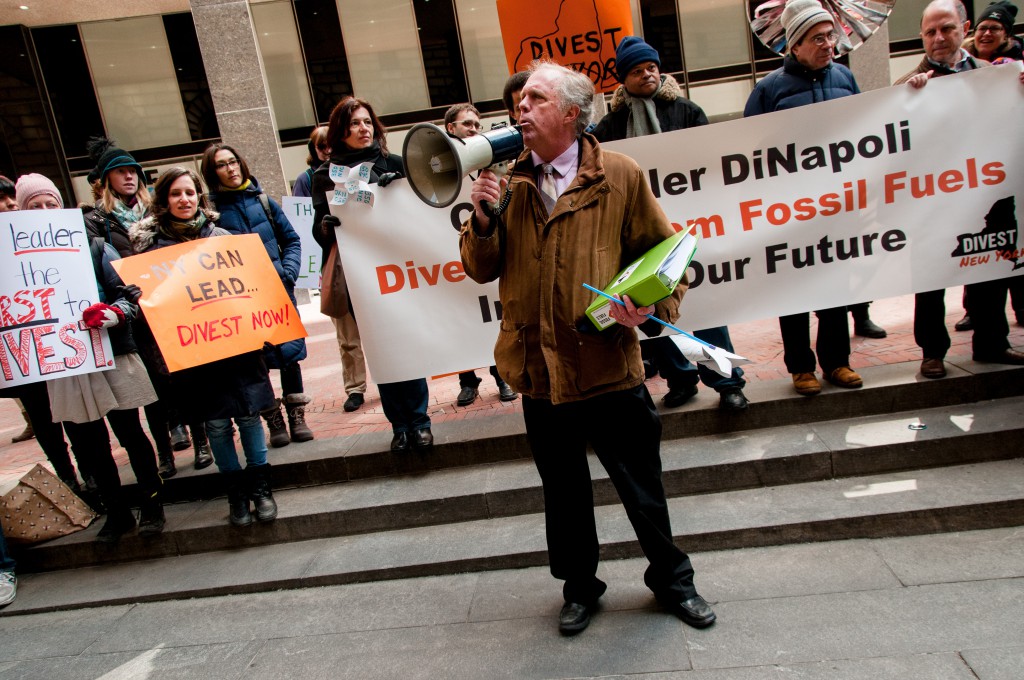One more way corporations can take over
Share

Why we must stop ratification of the Trans-Pacific Partnership
Editorial by Ursula Rozum, Green Party of New York State
Green Party activist Mark Dunlea addressing the March 27th, 2014 rally, organized by 350 NYC and allies in front of Comptroller DiNapoli’s office to demand that New York State divest from fossil fuels. ©Adam S. Welz 2014
The last specks of democracy and sovereignty we the people have left in the U.S. are under attack.
The Trans-Pacific Partnership (TPP) is an international trade pact crafted by multinational corporations and currently being negotiated in secret by the Office of the U.S. Trade Representative (USTR). Representative Alan Grayson of Florida describes the agreement as “an attack on democratic governance” and “a punch in the face to the middle class of America.” Green Party activists played a critical role in stopping “free” trade deals of the past. It is critical that we step up our game, join with our social movement allies, and help stop the TPP.
The TPP began as trade talks among a few Pacific Rim countries, but has been expanded to include Australia, Brunei, Canada, Chile, Japan, Malaysia, Mexico, New Zealand, Peru, Singapore, and Vietnam. While the public and media are not allowed to see the text, and members of Congress only receive limited, heavily restricted access, 600 corporations have been advising President Obama and suggesting amendments as they have full access to the documents. These include Monsanto, Walmart, Bank of America, JP Morgan, Pfizer, Cargill, Exxon-Mobil, and Chevron—some of the worst corporate citizens in the U.S.
If ratified, the TPP would establish a system of international tribunals (if it sounds creepy, that’s because it is) allowing corporations to challenge the laws, regulations and even court decisions of any member country—including local, county and state laws—if they are deemed to adversely impact the corporation’s expected future profits. Under the TPP’s “investor-state” provision, corporations would even be allowed to file preemptive lawsuits against proposed government actions before they are undertaken. In New York, for example, this could bring harsh challenges to municipalities that have passed anti-fracking legislation or enacted consumer protection laws. Currently, 180 New York municipalities have local ban on hydraulic fracturing, not counting the statewide defacto ban on fracking announcement on December 17, 2014.
If the TPP includes “investor-state” provisions similar to those in the North American Free Trade Agreement (NAFTA), gas companies could sue the U.S. for loss of profits resulting from local bans, similarly to what they are doing in Quebec and El Salvador. Quebec has a moratorium on fracking and U.S. based firm, Lone Pine Resources Inc., is suing the government of Canada for $250 million for lost profits. Similarly, the Canadian based Pacific Rim gold mining company is suing El Salvador for more than US$300m in compensation, after the tiny Central American country refused to allow it to dig for gold which would endanger the Lempa River, the water source for half of El Salvador’s population. These types of direct assaults on democracy must be stopped.
Provisions in the TPP threaten our local economy and the growing Buy Local movement of which many Greens are a part. Back in 2010, New York Senator Gillibrand expressed concern about the TPP’s impact on New York’s dairy farmers if local markets were to be flooded by imported dairy products from New Zealand. In a press release, Gillibrand stated, “I am especially concerned about the long-term national security implications of losing our ability to produce food here at home. We cannot outsource our dairy production to the lowest global bidder without risking the safety of our health and our local economies.” Gillibrand might as well be talking about NAFTA and it’s impact on Mexico’s corn growers. Millions of Mexican farmers who could no longer compete with heavily subsidized U.S. crops were displaced from their land, setting off a wave of migration northward.
The TPP is being negotiated under unprecedented secrecy because previous attempts to pass similar “free trade” pacts have been met with widespread public opposition. What’s particularly glaring is the consensus among U.S. political elites pushing these trade deals, from Clinton to Bush to Obama.
Currently, President Obama is looking for Congress to pass “fast track” trade promotion legislation. We can’t let this happen. “Fast Track” gives the White House authority to negotiate and sign the trade agreement without Congressional oversight. Lawmakers won’t be able to analyze or amend treaty provisions; they would only be able to vote “yes” or “no” to ratify the entire treaty. In order to stop the TPP, we must first stop Fast Track. Thus, the task at hand is to unite with our allies in labor, environmental, human rights, and democracy movements and lobby our congressional representatives as hard as possible to stop “Fast Track.” This is a time to be more than activists—we must be organizers. Activist organizations are already on alert that the TPP and Fast Track are bad news—all we need to do is activate our networks. In New York, Greens will be promoting TPP Tuesdays, weekly call-ins to Congress urging representatives to vote “No” on Fast Track. While this might seem like a small action, it’s important to have doable actions for activists of all experience levels to participate in – and the goal is to recruit more and more people to make calls every week, to be organizers. We the people need to make sure that Congress does not abrogate its Constitutional responsibility to regulate trade and protect our national sovereignty.
TPP would establish a system of international tribunals allowing corporations to challenge the laws, regulations and even court decisions of any member country if they are deemed to adversely impact the corporation’s expected future profits.
Expansion of unregulated, free trade isn’t inevitable. Grassroots movements in the past have successfully stopped the Multilateral Agreement on Investment, the Free Trade Area of the Americas, the expansion of the World Trade Organization, and others. Greens played an important role in stopping these undemocratic foreign policy initiatives.
The global justice movement broke into the American public consciousness with the November 1999 protest against the World Trade Organization (WTO) meeting in Seattle. According to observations by Alexander Cockburn and Jeffery St. Clair of Counterpunch, “The mostly young people pouring up Interstate 5 from Oregon and California and other states were the green street warriors who had managed by November 30 to paralyze downtown Seattle and shut down the opening ceremonies of the WTO conference. And these same young people made up the core organizers of Ralph Nader’s Green Party candidacy…”
Activists who had been very active in the grassroots global justice movement of the 1990s already were or became Green Party leaders. Ralph Nader was treated like a rock star at the Seattle WTO protests because of his early opposition to NAFTA and the Multi-lateral Agreement on Investment (MAI). Medea Benjamin, co-founder of Global Exchange, one of the most prominent global justice organizations in the U.S., went on to run for U.S. Senate in California as a Green candidate. Ben Manski, who had been active in national campus organizing in the lead up to the Seattle protest, eventually became the national staff person for the Campus Greens and is known to many today as campaign manager of the 2012 Jill Stein for President campaign. David Cobb, active in Texas mobilizing for the Seattle WTO protests and against the MAI, was the Green Party’s candidate for President in 2004.
In the Spring of 2001, the Campus Greens’ Green Heat campaign mobilized hundreds of students on American campuses to attend the Free Trade Agreement of the Americas protests at the Summit of the Americas in Quebec City. Greens organized teach-ins on campuses, in community centers and living rooms and participated in solidarity demonstrations across the U.S. One such demonstration on April 21, 2001 temporarily closed the Detroit-Windsor border. This campaign raised the visibility of the Campus Greens and drove the student effort to mobilize around the issue of international trade.
Green Party activists from all over the U.S. joined their allies in the global justice movement on November 17, 2003, in Miami to protest the Free Trade Area of the Americas, a trade pact modeled after NAFTA. It’s estimated that 22,000 people marched in Miami’s streets against the FTAA: unionists, civil rights groups, community organizations, farmers, students, Mexicans, and Canadians. The united message was “No to closed-door trade meetings. No to corporate-made law. No to the race to the bottom. No to the FTAA.” Over 300 Green flags were on display at the protest in Miami and Greens were warmly welcomed by other protesters.
The fight against the TPP is a continuation of these struggles against the neoliberal trade regime that is propelling a global race to the bottom. This is a fight about how society will be organized, and who has the authority to make those decisions. It’s corporate capital against people’s movements. If we want to create a democratic economic system and stop today’s ruling elite from dictating the terms of how we live, we must stop the TPP and all free trade schemes that will follow. As a party committed to grassroots democracy and a just, peaceful future, the Green Party must take seriously our obligation to fight against global corporate rule, wherever that fight manifests itself: in the streets, at public hearings (which can be used as educational and organizing opportunities), in the courts and at the ballot box. Stopping the TPP is within our reach—we must use this historic opportunity, like Green Party activists have in the past, to work alongside social movements wherever we are. We must resist everywhere. We must offer alternatives everywhere. And our objective must be to win.
To learn more about efforts to stop the TPP, get online and check out the Green Shadow Cabinet, Flush the TPP, Public Citizen…there are endless resources available. Don’t wait…participate!





